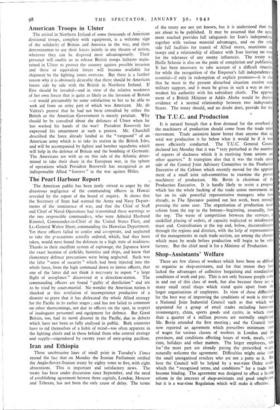Shop -Assistants' Welfare
There are few classes of workers which have been so difficult to organise as shop-assistants, and for that reason they hag lacked the advantages of collective bargaining and standardised conditions of work and pay. This' is not only because people come in and out of this class of work, but also because there are so many small retail shops which stand quite apart _ from the larger organisations of employers. In view of these difficulties far the best way of improving the conditions of work is through a National Joint Industrial Council such as that which was appointed for a group of retail trades including furniture. ironmongery, china, sports goods and cycles, in which more than a quarter of a million persons are normally employed. Mr. Bevin attended the first meeting ; and the Council have now reported an agreement which prescribes minimum rates of wages for various classes of workers in London and the provinces, and conditions affecting hours of work, meals, over- time, holidays and other matters. The larger employers, who for the most part are already paying the prescribed wages, naturally welcome the agreement. Difficulties might arise troll the small unorganised retailers who are not a party to it. But here the Council will be helped by a war-time Order under Which the " recognised terms, and conditions " for a trade mai become binding. The agreement was designed_ to effect a lasting reform in the interests of shop-assistants and good employe but it is a war-time Regulation which will make it effective.


























 Previous page
Previous page